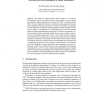Free Online Productivity Tools
i2Speak
i2Symbol
i2OCR
iTex2Img
iWeb2Print
iWeb2Shot
i2Type
iPdf2Split
iPdf2Merge
i2Bopomofo
i2Arabic
i2Style
i2Image
i2PDF
iLatex2Rtf
Sci2ools
148
click to vote
FASE
2007
Springer
2007
Springer
Activity-Driven Synthesis of State Machines
The synthesis of object behaviour from scenarios is a well-known and important issue in the transition from system analysis to system design. We describe a model transformation procedure from UML 2.0 interactions into UML 2.0 state machines that focuses, in contrast to existing approaches, on standard synchronous operation calls where the sender of a message waits until the receiver object has executed the requested operation possibly returning a result. The key aspect of our approach is to distinguish between active and inactive phases of an object participating in an interaction. This allows us to generate wellstructured state machines separating “stable” states, where an object is ready to react to an incoming message, and “activity” states which model the computational behaviour of an object upon receipt of an operation call. The translation procedure is formalised, in accordance with the UML 2.0 meta-model, by means stract syntax for scenarios which are first translated i...
Related Content
| Added | 07 Jun 2010 |
| Updated | 07 Jun 2010 |
| Type | Conference |
| Year | 2007 |
| Where | FASE |
| Authors | Rolf Hennicker, Alexander Knapp |
Comments (0)

